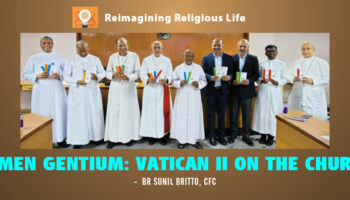“The one who through asceticism and contemplation has known how to dig in himself the wells of virtue and knowledge as did the patriarchs will find Christ within as the spring of life. Wisdom bids us to drink from it, saying, “Drink waters from your own vessels and from your own springs.” If we do this, we shall discover that His treasures are present within us.”
(Chapters on Knowledge, Second Century, 40)
The honorific ‘Confessor’ could lead one to believe that Maximus was a confessor par excellence with multitudes flocking to him for confession in the manner they flocked to the Curé d’Ars. Maximus, however, did not get this honorific because of his work at the confessional, but due to his confession of faith in the face of severe persecution. The emperor was disappointed that Maximus did not give in to his diktats and, after the farce of a trial, banished him into exile. Even exile did not silence Maximus. He continued to speak and write in defense of the faith. Finally, he was given the incredibly cruel “Persian punishment,” i.e., his tongue and hand—which were used to confess the faith—were cut off. This sacrifice led him to receive the honorific ‘Confessor.’
Maximus was born in 580 CE into a Christian family that belonged to the elite of the city. He received the best education of the day and was appointed the proto-secretary of the then emperor Heraclius at an early age. However, three years later, he entered monastic life and remained a monk in what is modern day Turkey until the spring of 626 when the Persians, Slavs and Avars were attacking Constantinople. He departed for North Africa, where he remained for a quarter of a century. During this period he strongly opposed Monothelitism (Christ having one will) and Monoenergism (one energy). Though it seems a trivial and speculative debate, Maximus realized that this position seriously compromised the humanity of Christ. During a famous theological debate in 645, he demolished Pyrrhus, the deposed Patriarch of Constantinople and a leading proponent of Monothelitism. In 646 he went to Rome and was close to Pope Martin I. Emperor Constans II tried to placate differing political groups by diluting the orthodox faith. This was what Maximus opposed. He was put on trial and the proceedings have been recorded in The Trial of Maximus. Though he was exiled, he refused to be silenced and was brutally tortured for refusing to sign a compromise statement of doctrine. The mutilation and tortures finally led to his death on the 13th of August, 662.
Maximus was an eminent figure for the Eastern and Western churches because he combined the profound speculation of the East and the historical salvific perspective of the West. His life reveals to us an integration of the orthodoxy of faith and authentic Christian living. His spirituality primarily revolved around the theme of divinization, which spoke of the human person truly becoming the image and likeness of God. The process of divinization would be rooted in the mystery of the Incarnation where God became incarnate so that we might ‘become partakers of the divine nature’ (2 Pet. 1: 4). For him divinization was not an abstract theme but a genuine transformation of not just the human person but all of creation so as to participate in Divine life. Though divinization was only possible through the grace of God, it also involved an act of free will. Only when the human person lets go of one’s self-love and surrenders totally to God does the grace of God transform and divinize the person. Maximus Confessor’ courageous response to the trials of his time was the result of his inner transformation – his progressive divinization. His life challenges us to discover our true selves and live lives of greater authenticity and radical discipleship.





